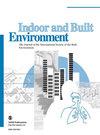A thermal sensation model for naturally ventilated indoor environments based on deep learning algorithms
IF 2.9
3区 工程技术
Q2 CONSTRUCTION & BUILDING TECHNOLOGY
引用次数: 0
Abstract
In recent years, with the emphasis on sustainability and energy efficiency, natural ventilation has attracted increasing interest from building designers. Natural ventilation is dependent on the outdoor environments which could change rapidly, and the traditional thermal sensation models such as the predicted mean vote (PMV) are not applicable, correspondingly. The deep belief neural network can reveal nonlinear patterns in processing big data, and it can be used to predict target data with high flexibility and accuracy. This study developed a deep belief neural network model for indoor thermal sensation prediction in naturally ventilated environments with outdoor environment parameters and human factors: outdoor air temperature, average radiant temperature, outdoor air relative humidity, outdoor wind speed, clothing thermal resistance, activity level, gender, age and weight collected in 10 semi-open classrooms and 5 laboratories in April and November when natural ventilation was used. The research compared the performance of deep belief neural networks with three neural networks: BP, Elman and fuzzy neural networks. Results showed that the deep belief neural network can enhance the performance of thermal sensation prediction of natural ventilated indoor environments. The research provides a more flexible and effective solution for thermal comfort prediction of natural ventilated indoor environments.基于深度学习算法的自然通风室内环境热感觉模型
近年来,随着对可持续性和能源效率的重视,自然通风引起了建筑设计师越来越多的兴趣。自然通风依赖于快速变化的室外环境,传统的热感觉模型如预测平均投票(PMV)不适用。深度信念神经网络能够揭示大数据处理过程中的非线性模式,能够以较高的灵活性和准确性对目标数据进行预测。本研究以4月和11月采用自然通风的10间半开放式教室和5间实验室为样本,结合室外环境参数和人为因素:室外空气温度、平均辐射温度、室外空气相对湿度、室外风速、服装热阻、活动水平、性别、年龄和体重,建立了自然通风环境下室内热感觉预测的深度信念神经网络模型。研究比较了深度信念神经网络与BP、Elman和模糊神经网络的性能。结果表明,深度信念神经网络可以提高自然通风室内环境的热感觉预测性能。该研究为自然通风室内环境热舒适预测提供了更为灵活有效的解决方案。
本文章由计算机程序翻译,如有差异,请以英文原文为准。
求助全文
约1分钟内获得全文
求助全文
来源期刊

Indoor and Built Environment
环境科学-工程:环境
CiteScore
6.40
自引率
25.00%
发文量
130
审稿时长
2.6 months
期刊介绍:
Indoor and Built Environment publishes reports on any topic pertaining to the quality of the indoor and built environment, and how these might effect the health, performance, efficiency and comfort of persons living or working there. Topics range from urban infrastructure, design of buildings, and materials used to laboratory studies including building airflow simulations and health effects. This journal is a member of the Committee on Publication Ethics (COPE).
 求助内容:
求助内容: 应助结果提醒方式:
应助结果提醒方式:


